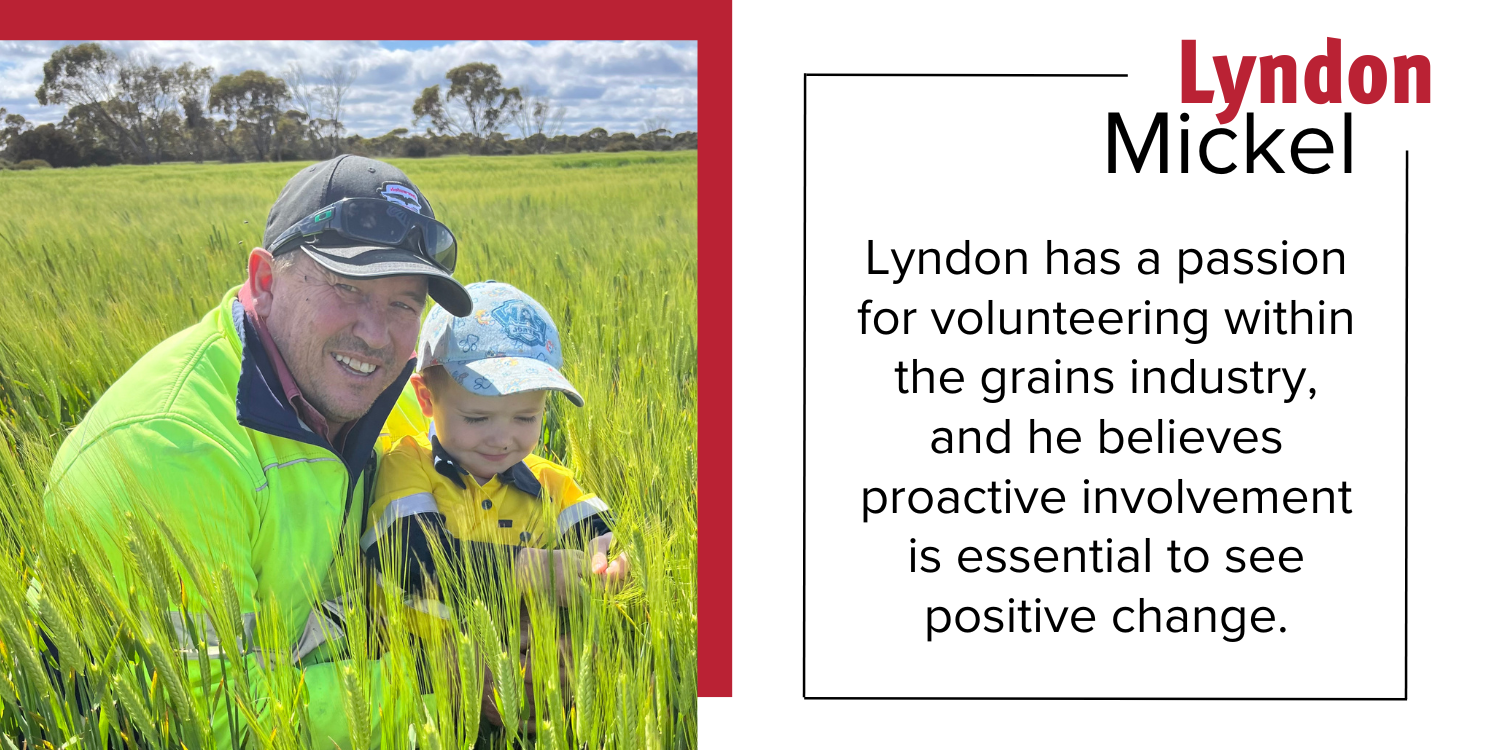
LYNDON MICKEL is a broadacre crop farmer from Beaumont within the Shire of Esperance. He and his wife used to run a mixed farming operation, however after a restructure of the business, they got out of stock about seven years ago and have been running a 100% cropping operation since, increasing their cropping area to over 5,000 hectares per year.
Lyndon was a member of the executive committee of the South-East Premium Wheat Growers Association (SEPWA) from 2005 and joined GIWA in 2015, to provide greater representation of growers in the Esperance port zone. Lyndon was chair of the GIWA Barley Council from 2017 – 2022 and a member of the GIWA Board.
In October 2021, Lyndon was appointed chair of the GIWA Board, a position he held for two years, and stepped down from SEPWA’s executive committee to dedicate his efforts on GIWA. Lyndon remains on the GIWA Board and is now Deputy Chair of the GIWA Barley Council.
Lyndon has a passion for volunteering within the grains industry and he believes proactive involvement is essential to see positive change. He enacted this sentiment when he helped initiate the Malt Barley Variety Rationalisation Program in 2017. This program has aided the agronomic efficiency of malt barley varieties and increased the assurance of produce quality for trade. Lyndon values GIWA’s holistic approach towards the supply chain, which he believes gives it a unique foothold in the expanding grains industry. We sat down and chatted with Lyndon about his voluntary roles with GIWA.
Lyndon, why did you join GIWA?
It was probably the next step for me. I’d been heavily involved with the local grain grower group South-East Premium Wheat Growers Association (SEPWA) in the Esperance port zone and had just finished my tenure as chair. One of the charters of SEPWA is to ensure that we have representation on industry bodies. That was part of the reason for getting involved with GIWA.
I was also encouraged by the late Steve Tilbrook, who was the long-standing chair of the GIWA Barley Council at the time, to join the Barley Council to maintain representation for the growers in the Esperance port zone.
GIWA is such a unique organisation, which looks after the whole supply chain of the grains industry. While others only look at specific parts of the supply chain, such as pre-farmgate, post-farmgate, breeding programs etc, GIWA is involved in all facets of the industry supply chain.
How long have you been involved with GIWA and what roles have you undertaken?
I joined the GIWA Barley Council in 2015 and I’ve been a member ever since. In 2017 I was elected chair of the Barley Council and joined the GIWA Board. I was elected chair of the GIWA Board in 2022 and stepped down last October. I’m still on the Board and now Deputy Chair of the Barley Council.
In your roles with GIWA, what are you most proud to have been involved in and how has this contributed to the grains industry?
During my time with the GIWA Barley Council, we brought in the Malt Barley Variety Rationalisation Program, which has been extremely successful. I think that’s been a real feather in our cap. In my time on the board we’ve seen the capacity of the board grow significantly and have been recognised for our work by industry.
Why do you volunteer for these roles within GIWA?
It was just a passion. My father was involved in local government for a long time, and my view is, if you’re going to be involved in something and want to have your say, you’d best be proactive and get involved with an organisation like GIWA. It’s easy to sit back and criticise decisions made, but it’s more proactive and rewarding to be a part of the decision-making process.
I live 120km east of Esperance, so travelling up to Perth for meetings does take time, but you only get out of an organisation as much as you put in. So, while it does take time away from the farm, it’s been extremely beneficial for me as a person as well as my business.
It has truly been humbling that a grain grower from the back blocks of Beaumont could lead, not only the Barley Council, but also the GIWA Board. It has allowed me to meet and connect with people right throughout our great industry, from fellow growers through to Agricultural ministers, an experience I will greatly treasure.